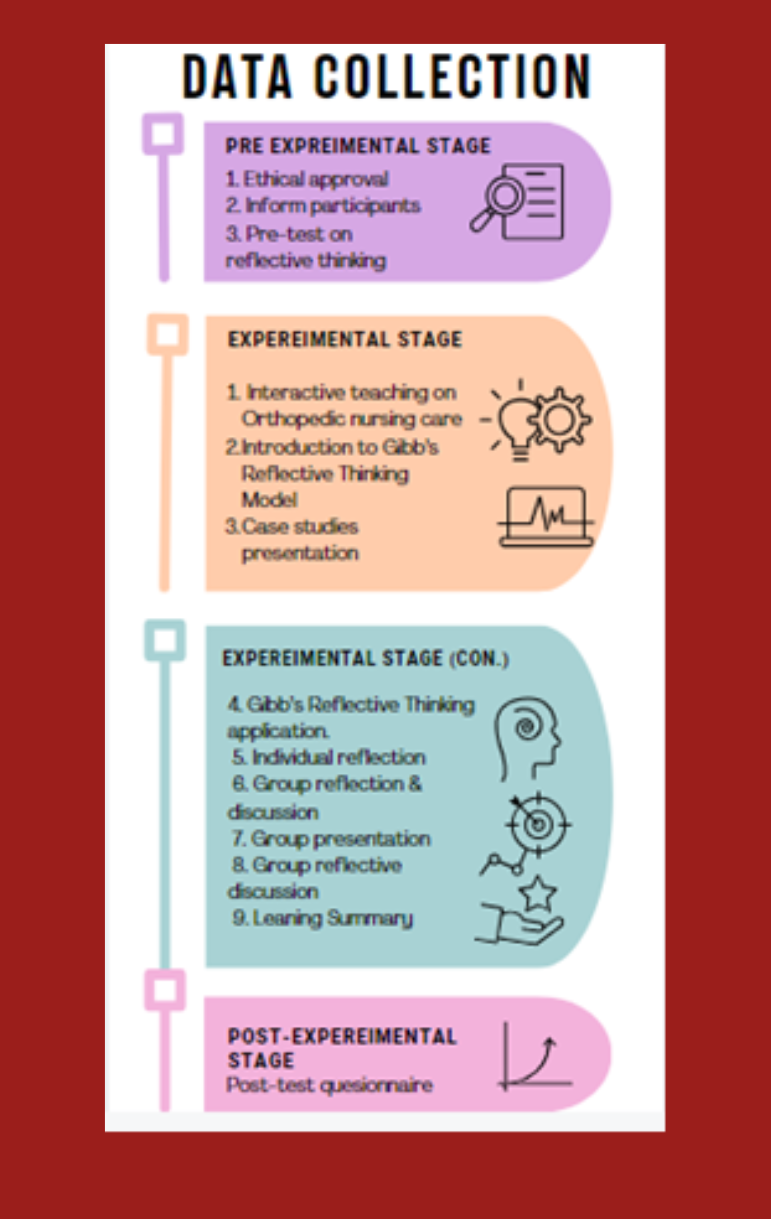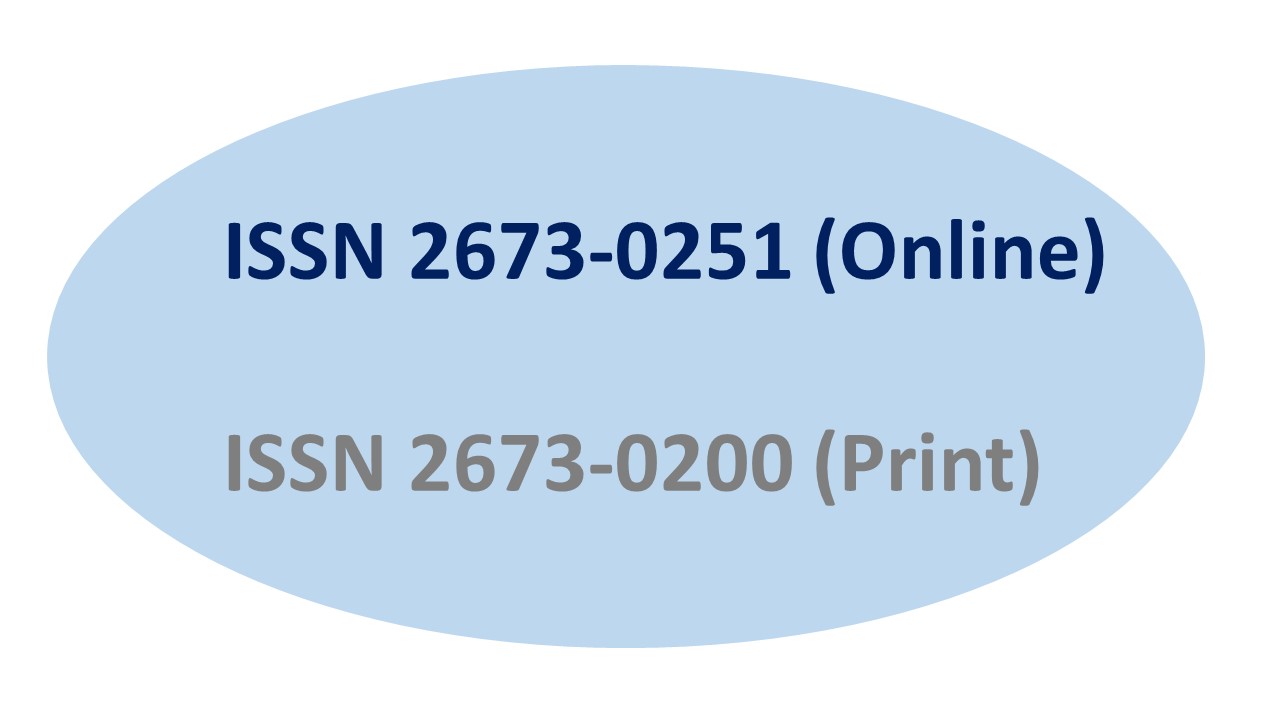Effects of Online Learning with Reflective Thinking Technique to Promote Learning Skills among Nursing Students
Keywords:
Online learning, Reflective thinking, Learning skills, Nursing studentsAbstract
This one–group quasi-experimental research aimed to investigate the effects of online learning through reflective thinking. This andragogy was designed to promote learning skills of nursing students at Boromarajonani College of Nursing, Buddhachinaraj, Phitsanulok Province, Thailand. A total of 125 third-year nursing students were purposely recruited for the study. The research instrument consisted of a combination of online teaching andragogy and reflective thinking assignment while studying Adult Nursing courses. Participants completed a reflective thinking assessment form and reflective thinking assignment, underpinned by Gibb’s reflective cycle method. The form was developed by researchers with adequate validity (Cronbach’s alpha coefficients 0.93). Data were analyzed using descriptive statistics, and paired t-tests. The processes of online learning with reflective thinking technique were observed, discussed and analyzed the content.
The results revealed a statistically significant improvement in the students' reflective thinking skill after participating (Mean=4.11, SD=0.51) compared to before participating (Mean=3.84, SD=0.53; p < 0.001). It also fostered learning skills, namely: cognitive skills development, collaboration and communication skills, career and learning skills, and computing and IT literacy skills, which are crucial for nursing students in the 21st century. We concluded that a combination of online teaching and reflective thinking could offer some inspiring and uplifting guidance regarding learning skills.
References
Abdulazeem, H., Vasanthan, L. T., Martinez, E. Z., Zucoloto, M. L., Østengaard, L., Azzopardi-Muscat, N., Zapata, T., & Novillo-Ortiz, D. (2023). Barriers and facilitators to utilizing digital health technologies by healthcare professionals. NPJ Digital Medicine, 6. https://doi.org/10.1038/s41746-023-00899-4
Akpur Uğur, (2020). Critical, reflective, creative thinking and their reflections on academic achievement, thinking skills and creativity, Volume 37, 100683.
https://doi.org/10.1016/j.tsc.2020.100683
Altın, M., & Saracaloğlu, A. S. (2018). Creative, critical and reflective thinking: Similarities-differences. International Journal of Contemporary Educational Studies,.4(1), 1-9.
Bellanca, J., & Brendt, R. (Eds). 2010. 21st Century skills: Rethinking how students learn. Bloomington:Solution Tree Press.
Bergdahl, N., (2022). Engagement and disengagement in online learning. Computers & Education, 188(12). https:// DOI:10.1016/j.compedu.2022.104561
Buchanan, R. M., Cooney, K. E., & Lynaugh, J. A. (2019). Reflective learning practices in nursing: An integrative review. Nurse Education Today, 81, 85-94.
Boromarajonani College of Nursing Buddhachinaraj [BCNB]. (2020). Curriculum management handbook B.E. 2563. Phitsanulok: Boromarajonani College of Nursing Buddhachinaraj. [in Thai].
Celeste, R.J., & Osias, N., (2024). Challenges and implementation of technology integration: Basis for enhanced instructional program. American Journal of Arts and Human Science, 3(2): 106-130
Chaisa, P., & Janwijit, S. (2020). The effects of reflective thinking skill promoting based learning and instruction on reflective thinking behaviors among nursing students. Journal of Education Studies, 48(1), 224-238.
Choy, S. C., Lee, M. Y., & Sedhu, D. S. (2019). Reflective thinking among teachers: development and preliminary validation of reflective thinking for teachers questionnaire. Alberta Journal of Educational Research, 65(1), 37–50.
Dewey, J. (1933). How we think: A restatement of the relation of reflective thinking to the educative process. Boston, MA: D.C. Heath & Co Publishers.
Donkin, R., & Francis, A. J. (2019). Reflective thinking in online learning: Best practices and challenges. Journal of Nursing Education, 58(5), 258-262.
Facione P.A. (2015) Critical thinking: What it is and why it counts. Measured reason LLC, Insight Assessment.
Garrett, B. M., MacPhee, M., & Jackson, C. (2017). Implementing high-fidelity simulation and reflective practice in a clinical nursing program. Journal of Nursing Education, 56(9), 56-60.
Gibbs, G. (1988). Learning by doing: A guide to teaching-learning methods. Oxford, UK.: Oxford Centre for Staff and Learning Development. Brookes University.
Ghanizadeh, A. (2017) The interplay between reflective thinking, critical thinking, self-monitoring, and academic achievement in higher education. Higher Education, 74, 101–114. https://doi.org/10.1007/s10734-016-0031-y
Gupta, M.M. (2021). Impact of coronavirus disease (COVID-19) pandemic on classroom teaching: Challenge of online class and solution. Journal of Education and Health Promotion, 10(155), 1-4.
Harerimana, A., Duma, S. E., & Mtshali, N. G. (2023). Measuring perceived learning gains of undergraduate nursing students in ICT skills: One group pre-test and post-test design. Contemporary Nurse, 59(2), 114–131.
Jensen, R., & Joy, C. (2020). Reflective thinking techniques in asynchronous online learning. Nurse Educator, 45(2), 83-87.
Kamany, W. (2014). Learning skills: The most essential skills in the 21st century. International Journal of Education and Development, 10(1), 1-10.
Kaya, E., Karatana, O., Yildirim, T.O. (2023). The relationship between the online learning process, 21st Century skills and work readiness in senior nursing students. Nurse Education in Practice, 73, 103801. https://doi.org/10.1016/j.nepr.2023.103801
Khumtorn, L., Suppasri, J., & Akarasuwankun, T. (2017). Nursing care of persons with psychiatric problems: The development of a practicum course to promote reflective skills among nursing students. The Southern College Network Journal of Nursing and Public Health, 4(1), 15-27.
Kolb, D. A. (1984). Experiential learning: Experience as the source of learning and development. Prentice-Hall.
Kozisnik, L. (2018). Self-regulated learning in nursing education: Impacts of online environments. Nurse Education in Practice, 31, 71-76.
Kunavikitikul, W. (2015). Teaching and learning in the discipline of nursing in the 21st century. Nursing Journal CMU, 42(2), 152-156. [In Thai]
Li, D. (2022). The shift to online classes during the covid-19 pandemic: Benefits, challenges, and required improvements from the students’ perspective. The Electronic Journal of e-Learning, 20(1), 1-18.
Liao, Y. C., & Wang, H. H. (2019). The effect of reflective thinking on critical thinking and clinical competence in nursing students. Nurse Education Today, 79, 104-110.
Likert, R. (1932). A technique for the measurement of attitudes. Archives of Psychology, 22 140, 55.
Mathuros, S. (2021). Management education online in the new normal covid-19, Rajapark Journal, 15(40), 33-42.
Menezes, V. (2020). Reflective practice in nursing education: Lessons from online simulation. Clinical Simulation in Nursing, 42, 19-25.
Ministry of Education, Government of India. (2020). 21st century skills, A Handbook. Central Board of Secondary Education, Delhi.
Mueannadon, R., Tirapaiwong, Y., Srichairattanakul, J., & Yutthayong, S. (2019). Learning development through reflective. Journal of Health and Nursing Research, 35(2), 13-25. [in Thai]
National qualifications framework (Revised Edition). (2017). Bangkok: OEC,
https://backoffice.onec.go.th/uploads/Book/1552-file.pdf
O’Flaherty, J., & Phillips, C. (2015). The use of reflective journals in nursing education: Benefits and challenges. Nurse Education Today, 35(7), 663-670.
Panich, V. (2017). 21st Century skills: Learning for life in our times. Walailak Journal of Learning Innovations, 1(2), 3–14.
Salido, A., & Dasari, D. (2019). The analysis of students' reflective thinking ability viewed by students' mathematical ability at senior high school. Journal of Physics: Conference Series, 1157(2), 1-6.
Suworawatanakul, W., Natchamnong, S., & Leaungsomnapa, Y. (2016). The effects of development reflective thinking skills and levels of reflective using reflective thinking learning program on nursing students, Boromarajonani College of Nursing Changwat Nonthaburi, Journal of Phrapokklao Nursing College, 27(1), 61-71.
Thangkratok, P., Lhimssnthon, B., Palachewa, N., & Tongtham, A., (2021). Online nursing education during the coronavirus-9 pandemic: A case study of the epidemiology course. Journal of Thailand Nursing and Midwifery Council, 36(3), 31-44.
Verkuyl, M., Hughes, M., Atack, L., & McCulloch, T. (2017). Virtual simulation in nursing education: Challenges and future directions. Nurse Education Today, 54, 48-53.
Wah Chu, S., Lau, S., & Li, K. (2017). 21st century skills: A guide for educators. Hong Kong: The Education University of Hong Kong.
Wayo, W., Charoennukul, A., Kankaynat, C., & Konyai, K. (2020). Online learning under the covid-19 epidemic: Concepts and applications of teaching and learning management. Regional Health Promotion Center 9 Journal, 14(34), 285-298.
Wangruangsatid, N., & Kaewsasri, P. (2023). The development of critical thinking skills in nursing students through reflective thinking. Journal of Nursing Education and Practice, 13(1), 1-10.
Wangruangsatid, R., & Kaewsasri, A. (2022). The perception of learning outcomes under the qualification framework for higher education among graduates of Nursing Science in academic year 2020 at Boromarajonani College Buddhachinaraj. Journal of Boromarajonani College Buddhachinaraj, Surin, 12(1), 78-93. [in Thai]
Wichainate, K. (2014). Reflective thinking: Teaching students to develop critical thinking in practice. Journal of The Police Nurse, 6(2), 189-199.
World Health Organization [WHO]. (2020). Considerations for school-related public health measures in the context of COVID-19.

Downloads
Published
Issue
Section
License
Copyright (c) 2024 International Journal of Public Health and Health Sciences

This work is licensed under a Creative Commons Attribution-NonCommercial-NoDerivatives 4.0 International License.
If the manuscript is accepted for publication, copyright of the article shall be assigned to the IJPHS. After acceptance of a manuscript, the authors will be requested to complete a copyright transfer agreement form






